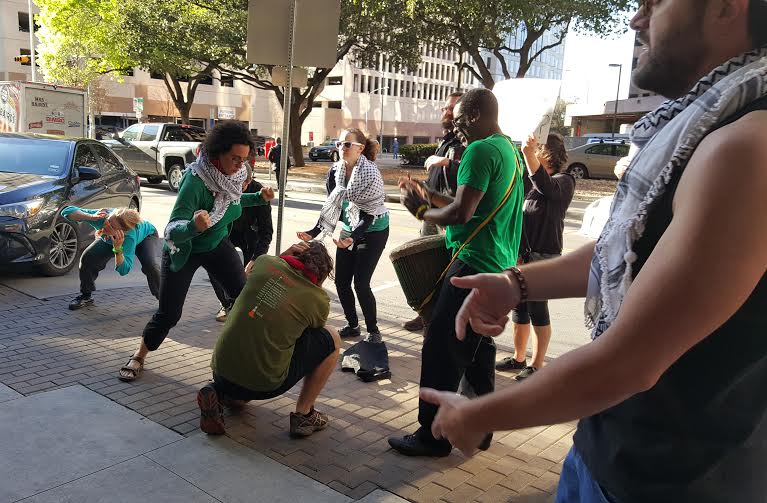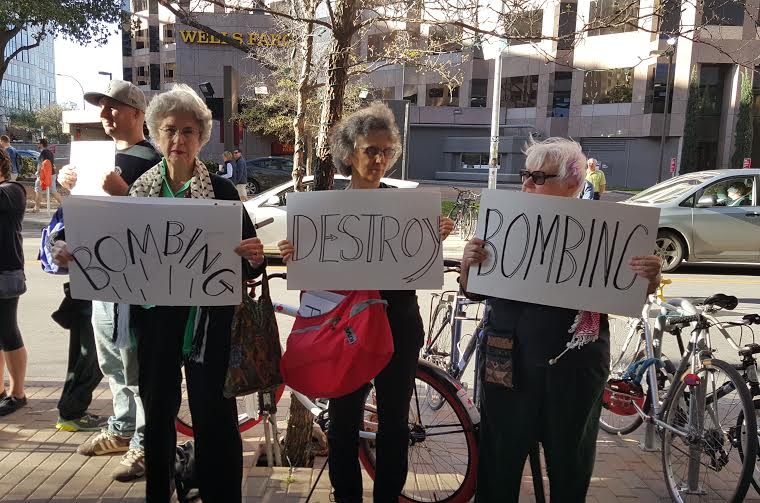Above: An activist holds a “Stop Israeli Terrorism” sign outside the JW Marriott hotel in Austin, Texas on March 14, 2016. Jewish Voice For Peace organized the protest against the Israeli ambassador’s appearance on the SXSW panel, “Building The Perfect Country.”
As SXSW conference attendees entered a hotel in downtown Austin, Texas, JVP activists rapped, drummed, and danced to illustrate the harm caused by Israeli occupation.
AUSTIN, Texas — At least two dozen activists drummed, rapped, and danced as SXSW attendees streamed into the JW Marriott in downtown Austin, Texas, on Monday morning for a panel titled “Building The Perfect Country.”
Panelists included Ido Aharoni, the consul general of Israel in New York and one of the key minds behind “Brand Israel,” a campaign aimed at boosting the nation’s image abroad by adopting marketing techniques used by successful companies.
“Our brand was almost universally, is almost universally associated with conflict,” Aharoni said at the panel held during SXSW, the annual nine-day music, film and technology festival held here. He compared Israel to other countries like Turkey, which are perceived more favorably than Israel even though they’re also home to “geopolitical conflict” and human rights abuses.
Organized by the local chapter of Jewish Voice For Peace, the protesters outside the panel objected to the idea that a country based on occupation could be anything resembling perfection.
Haithem El-Zabri, a Palestinian-American activist and organizer with the Interfaith Community for Palestinian Rights, told MintPress News why he participated in the protest:
“Brand Israel is part of Israel’s public relations campaign to improve its image and shift attention away from the oppression it inflicts on the Palestinian people, It helps them get away with more of their crimes and the slow genocide.”

While Aharoni denied that his efforts involved “shying away” from the conflict, the liberal Jewish media outletForward reported in 2005 that Brand Israel focused on “downplaying religion and avoiding any discussion of the conflict with the Palestinians.”
And although Aharoni claimed during the panel that Jewish culture welcomes dissent and questioning of authority, hotel security seemed far less welcoming. Early in the protest, a pair of security guards attempted to force the group to disperse, claiming that a city ordinance made it illegal to drum there. The protest continued unabated, and the security guards eventually returned to directing traffic at the hotel entrance.
The dancers alternately depicted the suffering of Palestinians under occupation, and the hope for their eventual freedom. Other activists held signs bearing ominous words like “destroy” or “bombing” on one side, and hopeful ones on the other, such as “nurture,” and they’d flip their signs to reflect the actions of the dancers. Another sign asked: “Israel, is this perfect?”
“As people of conscience, we are here to point out that Israel’s colonialism, apartheid and state terrorism are the total opposite of what makes ‘a perfect state,’” said El-Zabri. “And we are here to say, Boycott Israel!”

Israel: Military and political power, but not happiness
The atmosphere surrounding the panel itself was tense, and the event was guarded by an unusual number of police and security guards compared to other panels, including one official in a SXSW jacket who used his radio to notify his superiors that this reporter was “acting suspiciously” when he passed between the protest and the event inside.
Aharoni was joined by Anna Blender, a senior vice president at the consulting firm BAV, and Brian Kelly, editor and chief content officer for U.S. News and World Report. Kelly and Blender were inspired by Brand Israel to create the Best Countries survey, which attempts to rank nations based on global perceptions of a number of factors, including cultural heritage, support of human rights, and economic activity.
The survey, which will be repeated each year, was based on polls of over 16,000 people. The respondents were asked to rate how closely they associated 60 different countries with various attributes, including concepts like entrepreneurship, family-friendliness, and even sexyness.
Israel ranks #25 on the list, trailing behind top-ranked countries of Germany, Canada, and the United Kingdom. Although respondents closely associated Israel with military power and political influence, very few associated the nation with concepts like happiness, safety, respect for public property or income equality.
Some key demographics were likely left out of the polling. When asked by MintPress News whether disenfranchised groups like undocumented immigrants or occupied Palestinians were fairly represented in the polls, Blender admitted this was a gap in their methodology.
“In order to take the survey, you need to have an Internet connection,” she said. About 62 percent of Palestinians are online, according to one survey. She said they hoped to reach more of these underserved voices in future iterations of the poll.
“Human rights was a clear factor that people raised,” Kelly said, adding that women’s rights were among the most frequently cited concerns. The results show that very few respondents associated Israel with gender equality.

‘More than just a conflict’
Aharoni spoke openly about how Brand Israel seeks to change the global perception of his country. “After 70 years of arguing with our detractors,” he said, he and other officials switched to a new strategy, using brand marketing techniques.
In “nation branding,” as in marketing in general, he said, “if you will not tell your story, rest assured, your competition will do it for you.”
“Our job was to make sure people see Israel as more than just a conflict,” Aharoni said.
Perhaps proving his candor only stretched so far, he assured the audience that Israel welcomes critique: “There is no shortage of criticism in Israel, the most self-critical people in the world are the Israelis themselves.”
However, in a Feb. 25 report for MintPress, Richard Silverstein reported that Israel recently expanded the role of its military censor. Previously only charged with censoring military-related stories on TV, radio and print media, the office will now cover social media activists and bloggers as well.
The Israeli Defense Forces frequently target journalists during attacks on Palestine. On Feb. 16, two journalists, including The Washington Post’s Jerusalem bureau chief, were held on suspicion of “inciting Palestinians,” The New York Times reported.


